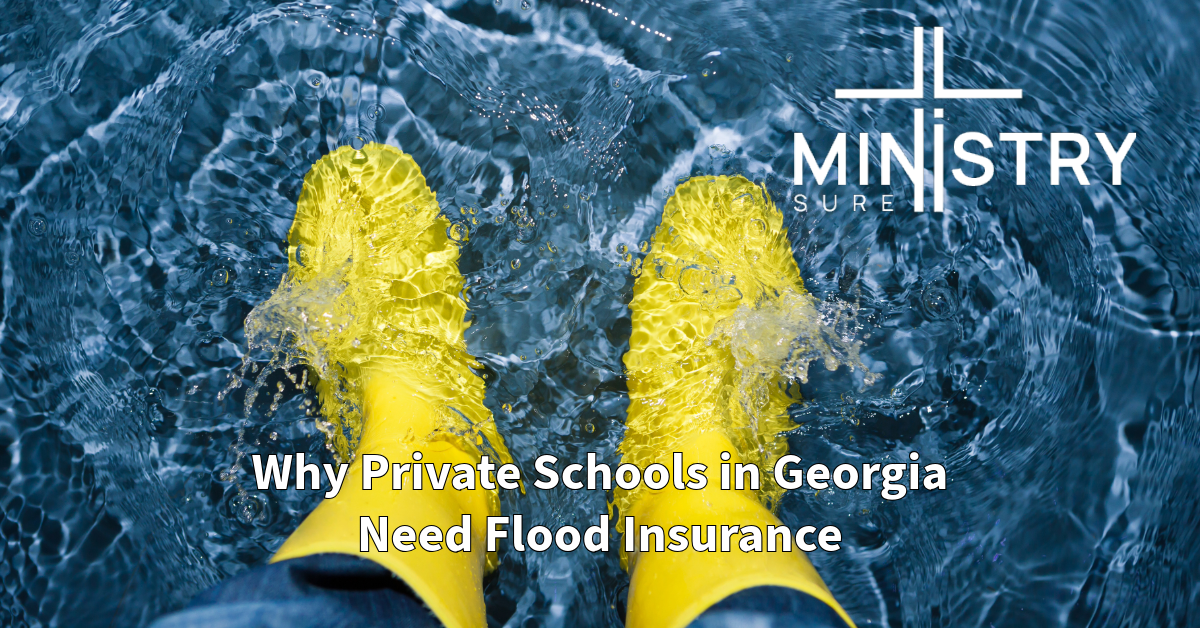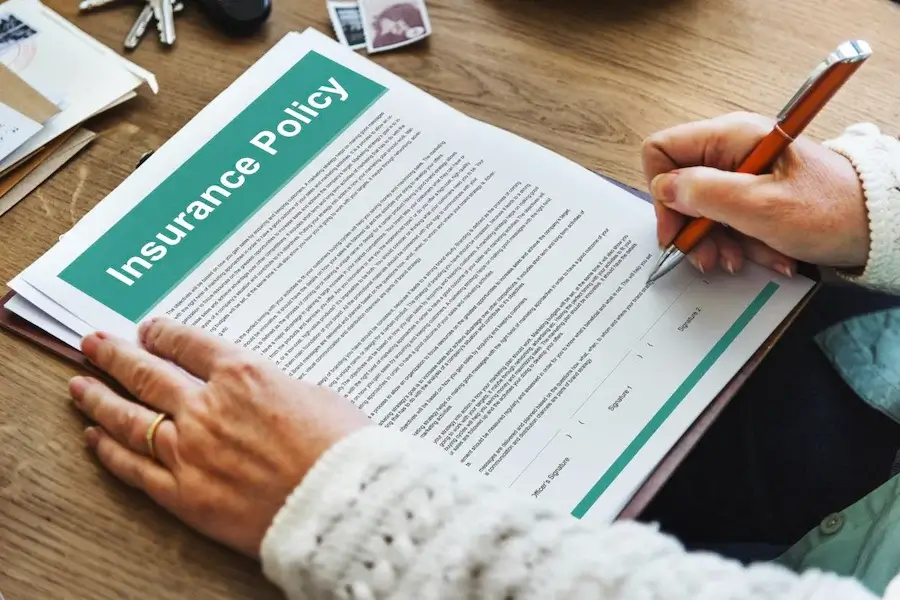An Atlanta-based Christian private school didn’t think the torrential rain would cause a significant amount of damage that would require weeks of repairs to their facility, while also requiring replacement of equipment, furniture, and many other damaged items.
Flooding can occur without warning, transforming tranquil communities into disaster zones within hours. In Georgia, where severe storms and rising waters are a recurring challenge, preparedness is particularly critical for private educational institutions. These schools, with their unique vulnerabilities, must recognize their exposure to flood risks to safeguard their students, staff, and valuable assets.
Despite Georgia’s reputation for picturesque landscapes, many regions are prone to heavy rainfall and flooding. Historical weather patterns reveal a concerning trend, with specific areas being more susceptible to floods. For private schools—institutions filled with valuable resources and safe spaces for students—understanding and assessing these risks is essential.
This article explores the significance of flood insurance for Georgia’s private schools. We’ll delve into why this coverage is necessary, discuss the available options, and outline the key components of comprehensive protection. By addressing these factors, private institutions can better secure their future and prioritize the safety of their communities, even when faced with environmental challenges.
Assessing Flood Risk in Georgia

In Georgia, private schools, including many with religious affiliations, must consider the flood risks they face and the importance of securing the right flood insurance. With FEMA’s Risk Rating 2.0 now in effect, flood insurance premiums are assessed individually, meaning even neighboring properties can have vastly different rates. Schools located in high-risk areas are likely to face higher premiums as a result.
The shift to a risk-based rating system has led to noticeable changes in premium costs. For instance, in Lowndes County, the average annual flood insurance cost, once around $638, is expected to rise by 55% to $992 as properties are evaluated based on their full risk. Schools can, however, reduce their premiums by opting for policies with higher deductibles.
There are also significant regional differences in flood insurance premiums within Georgia. In Fannin County, rates are projected to increase by 153% under the new risk-based framework. This makes it essential for private schools in Georgia to understand their specific flood risks and insurance needs.
Historical Weather Patterns
Georgia’s history shows that certain counties, like Fulton, are particularly vulnerable to flooding, with 72 flood events recorded between 1996 and 2019. Neighboring counties such as DeKalb, Gwinnett, and Cobb have also faced numerous floods, indicating a broader regional susceptibility. The major flooding event in December 2023, which caused $1.3 billion in damages due to heavy rainfall and snowmelt, is a stark reminder of why adequate flood insurance is so important.
Significant flood events often lead to a rise in the number of flood insurance policies in affected areas. Additionally, areas with higher education levels and older populations tend to have more residents with flood insurance—a pattern that can be seen in the historical analysis of insurance trends across Georgia.
Areas Prone to Flooding
Georgia’s landscape varies, but the northern part of the state, despite having fewer designated Special Flood Hazard Areas (SFHAs), remains highly susceptible to flooding. SFHAs are marked on FEMA flood maps where there is a 26% or greater chance of severe flooding over a 30-year mortgage. It’s important to note that more than one-third of flood-related claims come from homeowners in low- to moderate-risk zones, underscoring the unpredictable nature of flooding.
With predictive models indicating a higher likelihood of flooding events, there has been an increase in private flood insurance options, suggesting a reevaluation of areas once considered lower risk. Flood danger isn’t confined to coastal regions; inland areas like the Midwest and parts of the southern U.S. also face significant flood risks. For Georgia’s private schools, this expanding scope of vulnerability highlights the need for a thorough risk assessment and securing comprehensive flood insurance, whether through private insurers or the National Flood Insurance Program (NFIP).
Why Flood Insurance Is Important for Private Schools
In Georgia, the ongoing threat of flooding poses a significant risk to private educational institutions, making flood insurance an essential part of their financial planning and risk management strategies. As important pillars of their communities, private schools must secure specialized flood insurance policies to protect against potential losses.
Flood insurance differs from standard commercial property policies, which usually don’t cover flood damages. That’s why private schools need independent flood insurance policies. The financial impact on these schools can be substantial, with the average cost of flood insurance in Georgia around $791 per year. Include this cost in the school’s budget to manage the expense of adequate coverage.
Insurance experts can help private schools determine the right policy limits and coverage, as each institution’s needs can vary greatly due to differences in size and location. With the right measures in place, private schools can better navigate the aftermath of flooding and minimize disruptions to educational services and the broader community.
For more detailed insights into specific types of insurance coverage, check out the following blogs:
- What Kind of Property Insurance Do Christian Private Schools Need?
- What Kind of Liability Insurance Do Christian Private Schools Need?
- The Importance of Professional Liability Insurance for Private Schools
Protection of Facilities and Assets
Flood insurance provides essential protection for private schools in Georgia, safeguarding both the physical and financial investments in their facilities and contents. Building coverage under flood insurance typically includes critical systems like plumbing, electrical services, heating systems, water heaters, and other permanently installed fixtures.
Additionally, contents coverage extends protection to school belongings such as furniture, electronics, and educational materials, which are highly vulnerable during a flood. The average cost for flood insurance in Georgia is about $732 annually, though this can vary depending on the county. Make sure to include these financial considerations in the school’s budget to allow continued operations even after a damaging flood event.
For more details on how insurance can protect your school’s assets, consider reading:
- What Insurance Covers Equipment at a Christian Private School?
- What Is Abuse & Molestation Coverage For Private Schools?
Coverage for Liability and Safety Concerns
Private schools have a heightened responsibility to provide a safe environment for students, staff, and visitors, making comprehensive liability and property insurance important. Liability insurance is a key part of a school’s risk management approach, addressing concerns related to accidents and injuries that might happen on school grounds.
Flood insurance is a specific form of property insurance that private schools should not overlook, particularly if they are located in flood-prone areas. Government-backed mortgages usually require flood insurance for properties in high-risk zones, which underscores the importance of such coverage in protecting a school’s assets from natural disasters.
One of the key benefits of flood insurance is that it allows for claim reimbursement without needing a formal disaster declaration from the president, providing a more reliable path to financial recovery. This makes flood insurance invaluable for maintaining the operational integrity of private schools facing the risk of flooding.
For a closer look at insurance considerations for your school, check out:
- Does Private School Insurance Cover Employees?
- What are Common Insurance Risks for a Christian Private School?
At MinistrySure, we work closely with trusted carriers like Brotherhood Mutual to provide tailored insurance solutions for private schools. These partnerships allow us to offer comprehensive coverage that protects your Georgia private school against the risks it faces every day, from property damage to employment practices liability.






